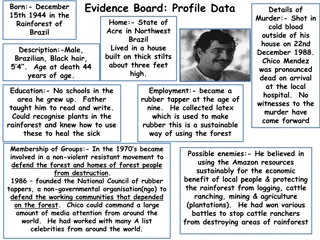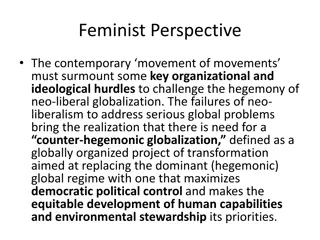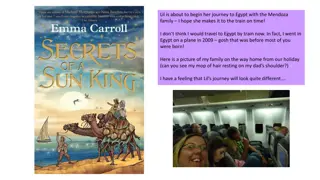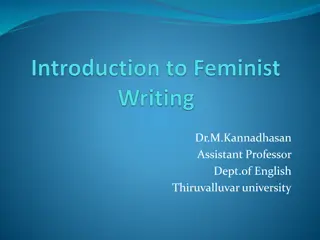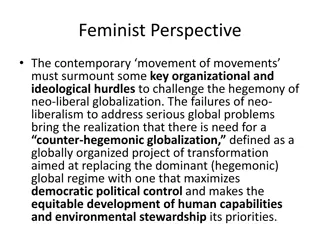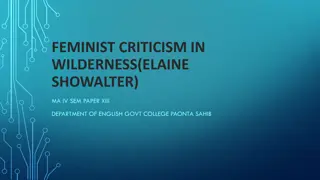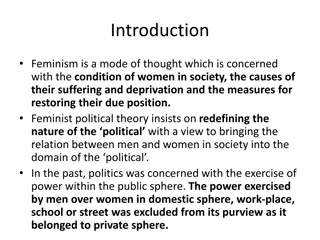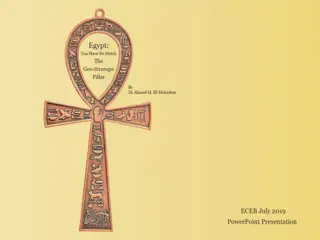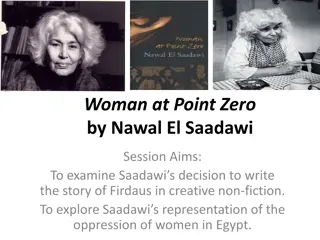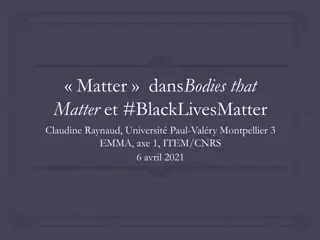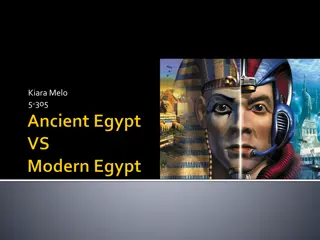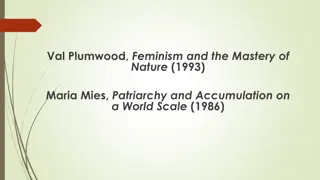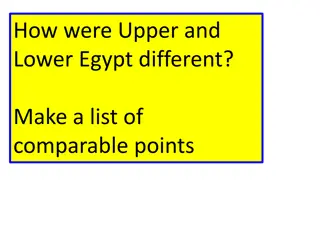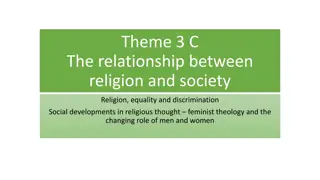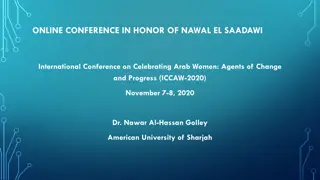Nawal El Saadawi - Leading Feminist Activist from Egypt
Nawal El Saadawi, a prominent figure in the Arab world, is a feminist, writer, doctor, and activist. She has fearlessly challenged traditional views on gender roles, advocating for women's rights through her writings and activism. Despite facing obstacles and censorship, she continues to be an influential voice in the fight against gender inequalities in the Middle East and beyond.
Download Presentation

Please find below an Image/Link to download the presentation.
The content on the website is provided AS IS for your information and personal use only. It may not be sold, licensed, or shared on other websites without obtaining consent from the author.If you encounter any issues during the download, it is possible that the publisher has removed the file from their server.
You are allowed to download the files provided on this website for personal or commercial use, subject to the condition that they are used lawfully. All files are the property of their respective owners.
The content on the website is provided AS IS for your information and personal use only. It may not be sold, licensed, or shared on other websites without obtaining consent from the author.
E N D
Presentation Transcript
BASIC FACTS Born in 1931 in Egypt Feminist, writer, doctor, Simone the Bouvoir of theArab world 1 author of novels, plays and non-fictional works all focusing on the issue of feminism founder of Health magazine, AWSA (Arab Women s Solidarity Association), editor of Al-n n - all canceled / forbidden by the Egyptian government Major topics covered religion, politics, FGM+male circumcision 1 https://www.britannica.com/biography/Nawal-El-Saadawi
WHY NAWAL? She was able to transform her personal tragedies into political action her personal experiences serve as a base for her activism Radically challenges ideas surrounding her and other people in the Middle East Attempts to stop her activity multiple times (imprisonment, forced to emigrate, lot of her work lost due to her unpopularity) not successful International speaks of Egyptian and Middle Eastern notions but also on gender worldwide + translated into many languages More generally Issues of Middle East evoke multiplicity of questions: What is the role of the Western world in the situation? Is Western feminism applicable or useful? Is radical feminism or secular feminism more useful than Islamic feminism? (feminists criticizing religion such as El Saadawi or feminists searching for equality in f.e. Quoran such as Ziba Mir-Hosseini)
GENDER INEQUALITIES CONTEXT El Saadawi challenges the gender inequality in the Middle East the traditionalist view on roles of men and women in society, politics, home space etc. Possible questions : Is gender inequality connected to religion or rather tradition? Who keeps the inequality going men, women, both? El Feki, S. et al. Eds. Understanding Masculinities. UNWomen.com. 2017. <https://www.unwomen.org/- /media/headquarters/attachments/sections/library/publications/2017/images- mena-multi-country-report-en.pdf?la=en&vs=3602> 22 May 2020.
FROM UNDERSTANDING MASCULINITIES (How many percent aggreed to the statements, 2016 in Egypt)
PERSONAL EXPERIENCE OF OPPRESSION El Saadawi uses her experience of oppression as a base for her activism often looking at her childhood but also at her family history Most of her non-fictional works discuss her life experiences multiplicity of memoirs, autobiographies Why did they favour my brother as regards food, and the freedom to go out of the house? Why was he treated better than I was in all these matters? Why could my brother laugh at the top of his voice, move his legs freely, run and play as much as he wished, whereas I was not supposed to look into people s eyes directly, but was meant to drop my glance whenever I was confronted with someone? (The Hidden Face of Eve: Women in the Arab World, 17)
NOTION OF PRIVILEGE On the other hand, she also shows herself as privileged changing perspectives from the victim to the survivor My family was educated and therefore differentiation between the boys and girls, especially as my father was himself a teacher, never reached the extent which is so common in other families. / / My brother tried to dominate me, in turn, but my father was a broad-mindedly man and tried as best he could to treat his children without discriminating between the boys and the girls. My mother, also, used to say that a girl is equal to a boy, but I used to feel that in practice this was often not the case. (The Hidden Face of Eve: Women in the Arab World 18)
EL SAADAWI ON RELIGION El Saadawi sees religion as problematic since it is often based on the notion of power as well as on gender inequality, and in the MENA region, religion strongly affects politics All children question religion because they have common sense. All religions are against common sense because all religions are based on double standard standard for women, standard for men, standard for the rich and standard for the poor. I cannot believe in a god that is not just, he - he or she - must be just. Or he cannot be a god. (Interview with The Guardian) When I was a child, the word God for me meant justice or freedom or love. How did it become a sword over my head, or a veil over my mind and face? I sang songs to my nation, to my country in my childhood and my youth. How has my country become a prison, or a policeman wearing a fez, a skull cap, a turban or a hat, speaking English, or classical or colloquial Arabic, or a dialect from the Gulf states as he pursues me day and night? (A Daughter of Isis: The Autobiography of Nawal El Saadawi 16) I began to realize that the third person referred to by him meant God, and that all the calamities which had befallen this house had come from God. I was still a child and did not realize what the word God meant, but it became linked in my mind to the word calamity, which in turn had something to do with what they called marriage. (A Daughter of Isis: The Autobiography of Nawal El Saadawi 40) On the other hand, she also defends Islam against Western misinterpretations and tendencies to see it as barbaric, inhumane etc. + her critique is not only addressing Islam but also Christianity and Judaism
EL SAADAWI ON FGM FGM is one of the most major issues arising from the conservative views held in the MENA region Saadawi shows that FGM is not a private matter, it is a public matter + a political issue it transforms human intimacy and body into means of control I did now know what they had cut off from my body, and I did not try to find out. I just wept, and called out for my mother for help. But the worst shock of all was when I looked around and saw her standing by my side. (The Hidden Face of Eve: Women in the Arab World 14) Experience with women from Sudan essential once again Saadawi acknowledges that her stance is more privileged or at least less tragic than the one of women from more conservative societies When a Sudanese woman is divorced, the external opening is narrowed once more to ensure that she cannot have sexual relations. If she remarries, widening is done again. (The Hidden Face of Eve: Women in the Arab World 17) She also speaks against the myth surrounding hymen seen as majorly important in conservative Islamic society she works against this ideas through her own political views but also uses her education as a doctor
FGM IN EGYPT https://www.dw.com/en/where-does-the-arab-world-stand- on-female-genital-mutilation/a-42472991 Laws 2008 + 2016 Open for discussion: Issues linked with complete ban xxx issues linked with proposed alternative solutions such as a ritual of putting herbs on female genitalia or a small ritual scratch performed by a doctor as a substitution for FGM etc.
EL SAADAWI ON MEN Divorced 3 times highly controversial in Egypt She sees the boundary between men and women and often depicts men as the oppressors, the violators HOWEVER she also sees that they themselves are oppressed through expectations put on them by the society They are also victims of a society that segregates the sexes, and that considers sex a sin and a shame that can only be practiced within the framework of an official marriage contract. (The Hidden Face of Eve: Women in the Arab World 22)
EL SAADAWI IN PRISON in 1981 she was imprisoned by the president Anwar Sadat for alleged "crimes against the State" and was not released until after his assassination "When I was in jail, the jailer said, 'If I find paper and pen in your cell, it's more dangerous than if I find a gun. (Interview forThomson Reuters Foundation) As for prison, in my opinion it is like death in that it is worth discovering. All my life I have regarded those entering and leaving prison as knowing something which I have not known, and living a life which I have not lived. (Memoirs from theWomen s Prison 39)
AMAL AMIREH : FRAMING NAWAL EL SAADAWI: ARAB FEMINISM IN A TRANSNATIONAL WORLD Speaks of El Saadawi s role in the Western world and her reception (as well as the risk of misinterpretation) + the risks of addressing different audiences For a decade and a half now, a constant stream of El Saadawi's work, mostly fiction, has been appearing in British and American bookstores, making her one of the most translated Arab writers, male or female. (216) Mentions introduction to The Hidden Face of Eve differences in Western and Middle Eastern reception El Saadawi's preface to the first English edition is an attempt to exert some control over her feminist critique of her culture, which she locates within an uncompromising critique of imperialism. In doing so, she anticipates the way Western audiences will read her book, realizing that they may try to use her criticism of her culture to further distance the third world from the first and to reaffirm stereotypes of it as underdeveloped and backward. If nothing else, her preface shows El Saadawi s awareness that she is addressing a different audience, with assumption and expectations different from those of the book s original Arab audience. 222 --- Middle Eastern critics then dismissed the introduction as not clear, too liberal etc. El Saadawi s voice and image, then, are framed by the Western discourse about her in a way that fits first-world agendas and assumptions: the socialist feminist is rewritten as a liberal individualist and the anti-imperialist as a native informant. This framing often discredits El Saadawi with her Arab audiences. 228 Often seen as an exception by the Western critics however in Egypt she was a part of a larger movement rather than a solitary fighter however, El Saadawi's nonfictional writing differed from the prevailing Egyptian feminist discourse of the time in that it focused on poor women, emphasizing their oppression and exploitation. 232
QUESTIONS Many questions can be discussed in relation to Nawal El Saadawi 1. Is there a boundary between private and public in her work? 2. Can someone be defined purely as a victim / an oppressor? 3. What is truly criticised? Religion / traditions / society / men / doctors / authoritarian regimes ? 4. Why is her work important in the Western world? Why is it so easily understandable? Can it be easily misinterpreted?
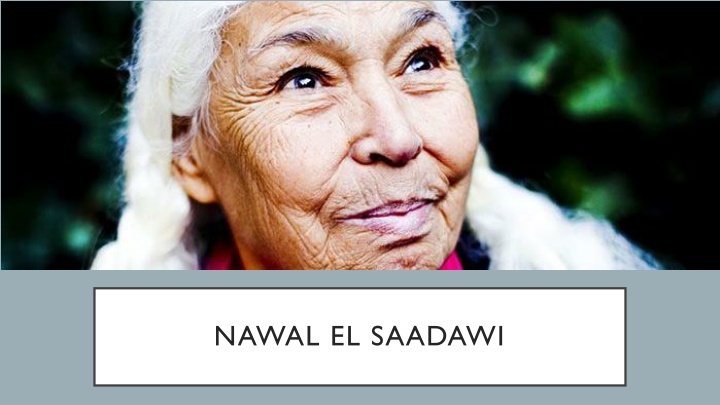

![[PDF⚡READ❤ONLINE] Tutankhamun's Trumpet: Ancient Egypt in 100 Objects from the](/thumb/20549/pdf-read-online-tutankhamun-s-trumpet-ancient-egypt-in-100-objects-from-the.jpg)
